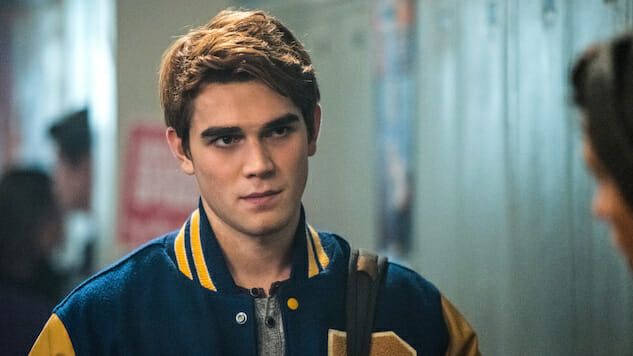Why Riverdale Is Not the Show We Need Right Now
And that's just fine.
Dean Buscher/The CW TV Features Riverdale
I can always feel it coming. The inevitable question that arises when it’s revealed that I do, in fact, partake in the latest pop culture TV phenomenon.
“Should I watch Riverdale?”
I know exactly what they’re looking for. Some kind of evangelizing praise, that it’s the “best show on TV right now,” or assurances that it “gets good” after a certain number of episodes. Or, at the very least, a clear-eyed conviction that they absolutely must drop whatever they’re currently binge-watching and immediately consume every episode. Some explanation as to the show’s rabid, rapidly growing online fan base.
But all I can muster is a shrug. “I like it!” Anything more exuberant feels like overkill, despite my wholehearted, irony-free enjoyment of the show. A modern update of the Archie Comics universe (and very loosely inspired by the publisher’s “New Riverdale” comic series), Riverdale finds pop culture’s most beloved redheaded doofus, Archie Andrews (K.J. Apa) reimagined for The CW’s predominantly teen target audience as an implausibly ripped hunk. The rest of the Archie crew have also been made over into sexier variants of their wholesome comic book personas, namely Jughead (Cole Sprouse) as a broody intellectual outsider and Betty (Lili Reinhart) and Veronica (Camila Mendes) as savvy pals more concerned with their budding BFF status than fighting over painfully average All-American Archie. Amid the hormonal high school drama is a soapy murder mystery, an absurd plot thread that combines Gothic horror, clandestine love affairs, and a decades-old family feud born out of a maple syrup dynasty. It’s as ridiculous as it is wonderful.
Celebrating pure gratification is certainly not new ground—reality TV especially has cornered the market on shallow yet addictive engagement. But what has been so refreshing about Riverdale is its welcome respite from the onslaught of the type of overblown critical analysis, or “hot take,” that has characterized so much writing about TV. It’s not important or particularly culturally resonant, and it’s not something that can be recommended with the same intellectual fervor as one might do for likes of The Sopranos, Breaking Bad or Mad Men. Which isn’t to say that Riverdale is even striving to be in the same league as such critically acclaimed prestige TV. It makes no effort to downplay the fact that it’s a teen drama—essentially Gossip Girl does Twin Peaks, complete with Jughead’s morose, overwrought narration, under the guise of writing a novel based on his hometown’s salacious goings-on.
Yet, there’s a disconnect between Riverdale’s supposedly youthful target audience and the 75-year-old characters upon which the show is built.
Riverdale is explicitly about nostalgia, both in its specific plot developments—Jughead lamenting the closure of the local drive-in—and its overarching theme—in which the murder of Jason Blossom is treated as emblematic of the town’s “loss of innocence.” But the show’s very existence is playing on a sort of false nostalgia. Its own target audience is likely too young to have much attachment to the classic iterations of Archie and the gang. That dissonance is where Riverdale is often smarter than it’s given credit for. It uses the sheen of a CW show packed with impossibly good-looking youths to play around with the idea that the classic Archie construct—the girl next door, the hot new girl, the weirdo, and an average white-male goof—are simply archetypes, the basic make-up of teen drama. It’s not Archie-specific nostalgia the show is playing on, but rather the same timeless dynamics that characterized works like The Breakfast Club or Buffy the Vampire Slayer.
As mentioned before, the online discourse surrounding Riverdale has been markedly free of speculation or fan theories about how the central mystery will unfold. Unlike the recent deluge of Westworld puzzle-boxing or the current stream of articles attempting to define the legacy of Girls (Paste’s included), the chatter about Riverdale is conspicuously quiet. An early installment that focused on Veronica’s crusade against slut-shaming was treated less as a ripped-from-the-headlines “very special episode” than as an ugly reality of high school gender politics. And the show itself doesn’t even rate its own murder mystery as a high priority, as the development of the case of Jason Blossom has carried equal dramatic weight with “Archie’s unfortunate non-abilities” (to quote Chip Zdarsky’s excellent run on the modern Jughead comic series) in his twin efforts to make a go of it as captain of the football team and a wannabe Ed Sheeran.
What we talk about when we talk about Riverdale has less to do with exalting it as a commentary on our times than it does with giggling over our teen crushes or determining which of our friends is the Jughead. It’s smart and it looks great (the Riverdale iteration of Pop’s Chock’lit Shop is cast in a glow of blazing red neon, like a nightclub straight out of a Nicholas Winding Refn movie) but it’s certainly not groundbreaking television. Even when discussing its addictive virtues, this is why I’m loathe to declare it as such. It can be tempting, but do to so would indulge my least favorite aspect of modern TV (and, so some extent, film) criticism. To voice a positive opinion about a show without having to declare it a masterpiece or the “best thing on TV right now” is a distinction rarely made when a new program hits the airwaves. Hyperbole tends to be rewarded with clicks, but true criticism is only effective when modulated.
To wit: Riverdale is not a masterpiece. But, I like it.
Riverdale airs Thursdays at 9 p.m. on The CW. Read our episodic reviews here.
Mallory Andrews is a senior editor for cléo, an online journal of film and feminism. She is a bi-weekly columnist for Movie Mezzanine, and has also contributed to The Dissolve, Indiewire, Cinema Scope and Esquire.